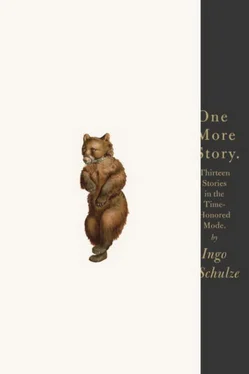Boris turned around to Elvira, maybe he was expecting some reaction from her, maybe he wanted to ask her something. Elvira’s head was resting on Susanne’s shoulder. Susanne could barely move a muscle but managed to carefully put a finger to her lips. When Boris offered to carry Elvira to bed, Susanne made a face. She evidently found it pleasant to have Elvira’s head on her shoulder, was even a little proud of it, I think.
Ines and Pavel said they needed to be going. Boris nodded, but neither of them got to their feet. Everyone else likewise went on sitting there and looking at Elvira. The thought crossed my mind that if we left now, we would never see Elvira again.
I would have liked to have said something about Fred’s story. I wanted to ask Boris if he remembered the brown water in those woodland ponds. I’d often gone swimming there myself. The bottom is very stony at that spot.
My recollection of that night at Boris’s turns hazy after Fred’s story, at least in terms of the contents and sequence of what was said. The mood, however, is just that much more present in my mind.
Fred, Lore, and Charlotte sat bent forward as if listening to a program on the radio. Now and then someone would reach out a hand for snacks or slices of baguette topped with tomatoes and cheese that Boris had brought in at some point.
A strange quiet had come over us. I’m intentionally avoiding the words “silence” or “hush,” even if — or so it seems to me — almost nothing was said for a long while, or if so only sotto voce. I was relieved that the strange tension that had descended over everything with Elvira’s showing up had now lifted. The stories had calmed Boris down as well. It bothered me that the storytelling had left me feeling good somehow.
I don’t know of course what actually kept Ines and Pavel there. But I’m sure that Susanne, too — even if Elvira’s head hadn’t been resting on her shoulder — would never have considered leaving now.
I may well make myself an object of mockery when I admit that it made me think of strip mines being phased out, and suddenly — nobody knows just how — all sorts of stuff starts sprouting, as if it were umpteen million years ago, as if it were nothing for nature to start all over again. That’s the feeling I had.
I didn’t tell any stories myself. Nothing ever happens to me that could be shaped into some kind of narrative. I’m not an entertaining sort of guy, sad to say — which used to distress me. I wondered if I should contribute something I’d heard on the radio a couple of weeks before, an incident that kept running through my mind. I’d probably recognize the woman’s voice. It was on Deutschlandfunk, an interview show plus classical music. The interviewee was an opera singer who had just given her farewell concert. I’ve forgotten her name, along with the whole interview really. Except for one question. The moderator wanted to know if it was possible to make new friends, real friends, friends for life, after the age of fifty. “Sure, why not?” the opera singer had exclaimed. The question had, as you could plainly hear, upset, almost outraged her. The moderator tried to explain her question, to which the singer then replied with a brusque, “No, I don’t believe a word of it!” In the silence that followed you could hear the rustling of paper until both began speaking at once, fell silent again, and the moderator said, “Please, please, it’s your turn!”
That’s when the singer told about a friend she had come to know eighteen months earlier in Chicago, an American originally from Germany, who had come to the States as a child in the late forties. I think his name was Rüdiger, at any rate a name no American can pronounce. This Rüdiger had come up to her in a coffee shop after hearing her speak with a German accent. He had invited her to join him the next day to visit the Chicago Board of Trade, where he worked. She described how the shouting began with the ring of the bell at nine on the dot and how much physical stamina it took just to stand for hours in the amphitheaters of the pits.
“You were going to tell us about a friendship,” the moderator said, breaking into the singer’s account. She, however, was undaunted and plowed ahead. “And later that afternoon it was this man of all people who told me that socialism was the only real solution, that one should help the poor and take something from the rich, that industries essential to human life should be nationalized, because state industries were still better than private monopolies. And then he asked me,” the singer said, “whether our way of life and the corrupt behavior that necessarily went with it wouldn’t drag the whole world into the abyss. At first,” the singer exclaimed, “I though he was joking, but he was in earnest, dead earnest. Nowadays I hate myself for thinking he was joking.”
“And so it was because of his views,” the moderator asked, “that you struck up a friendship with him?”
“He didn’t say anything,” the singer replied, “that we didn’t think and say here thirty or forty years ago, not one thing. He just hadn’t stopped saying it.”
There was another brief pause, then the moderator asked her next question. But the singer didn’t respond. Instead she asked, “Don’t you think there will always be wars as long as someone is making money off them?”
The moderator tried a different question, but the singer insisted: “Don’t you think that even here among us far too many people are making money off war?”
“That’s something I’m not prepared to discuss with you now,” the moderator said, and evidently signaled her director to play some music, so that all you heard was the singer’s next, “Don’t you think …” The music was followed by news, after which the interview continued without further incident.
I could have told about that. But it bore no relation to what had already been said. Besides which, recounting a radio show seemed a rather paltry contribution. I mention it, however, because I’ve asked myself a hundred times now what I would have done as the moderator. Probably have made the mistake of asking the singer about her American friend. Because what consequences should this Rüdiger have drawn from his views? Given up his job? Blown up the Board of Trade? Become a politician?
Mulling all this over, I fell asleep. I dreamed but no longer remember what about.
When I woke up, I winced — of course I found it unpleasant to have dozed off like that. But no one, not even Susanne, appeared to have noticed. Lore was saying, “And there it lay, wet, slimy, smelly.”
Boris, legs outstretched, head propped against the arm of his chair, had closed his eyes. Ines was lying on her back, her head in Pavel’s lap, her legs dangling over one arm of the four-seater. Charlotte was sitting on the rug with legs crossed, elbows on her knees, head propped in her hands, a half full ashtray in front of her. Only Lore and Susanne still seemed wide awake. I later had Susanne tell me the story of the huge fish, which Lore had read about somewhere. But by then Susanne was likewise getting things mixed up.
I then watched how Susanne, following the model of Ines and Pavel, bedded Elvira’s head in her lap without Elvira’s ever waking up.
I nodded off again and woke up again just as Pavel started telling about a friend who had become acquainted with a young woman early last year, a woman not only of noble birth, but rich too. Her parents had bought back their ancestral estate, between Berlin and the Märkische Schweiz, and whipped it back into shape — a Bauhaus castle, as Pavel put it, surrounded by a huge park. “We knew the park, we had taken walks there, it’s open to the public, with pavilions, ponds, meadows, and ancient trees. But whenever we got close to the house there would be signs, just barely taller than the grass, announcing, Private Property. You couldn’t help dreaming about living in a palace like that. So we were strolling around, and suddenly saw a woman sitting in the pavilion up ahead. She was reading, she didn’t even notice us. I could have approached closer, but I realized I was standing between two Private Property signs. I’m quite sure she wasn’t reading Goethe’s Elective Affinities , but no other book would have fit in so well. The most marvelous part was that the large meadow behind is on a low rise that blocks the view of what lies beyond it, so that it came to me that behind it must be the sea or at least a large lake, and the illusion didn’t shatter until you were just a few yards before the adjoining field. When I later learned who my friend’s new acquaintance was, I suddenly found myself believing in fate, but a fate that’s been jimmied out of whack, as if there’s been a mix-up, like dialing a wrong number, so to speak.…”
Читать дальше












